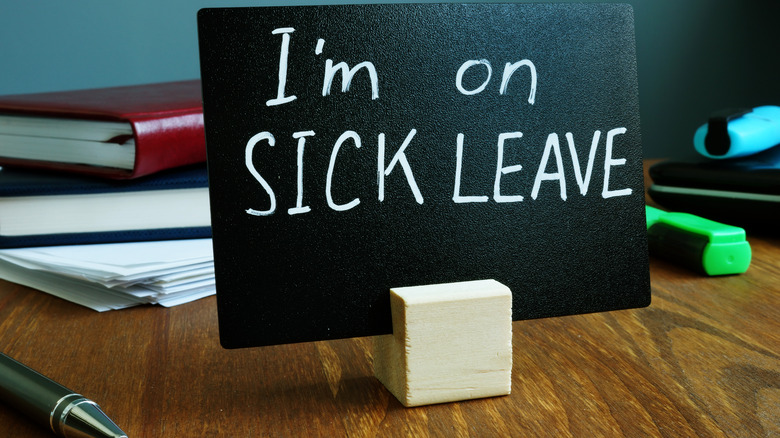Why Paid Sick Leave Can Actually Help You Live Longer
Paid sick leave may help you live longer, according to a new study published in the American Journal of Preventive Medicine. To assess the benefits of paid sick leave, researchers examined the mortality rates of working-aged people between 1999 and 2019 by evaluating mortality data from the Centers for Disease Control and Prevention (CDC), which included cause of death and location (via Healthline). After estimating the association between death counts, paid sick time, and minimum wage, researchers found that paid sick leave requirements are linked to lower mortality rates related to suicide, homicide, and alcohol use. In fact, the study's findings suggest that increasing paid sick leave from 0 to 40 hours per year could lower homicide mortality by over 13% among women and 8% percent for men.
On the flip side, not having paid sick leave can have the opposite effect. As a matter of fact, the study found that the mortality rate increased by 6% in places where state laws prevent local governments from mandating paid sick leave and minimum wage requirements (via Mic). According to Dr. Douglas Wolf, a professor of Public Administration and International Affairs at Syracuse University and lead author of the study, state preemption laws "elevate the risk of death among infants and working age-adults, and contribute to geographic disparities in mortality."
Paid sick leave can improve quality of life
In addition to potentially lowering the mortality rate, paid sick leave can also help improve quality of life (via Healthline). That's because people who don't have paid sick leave benefits at work often delay medical care and go to work when they're sick, which can lead to prolonged illness and even worsen other medical conditions. Workers who don't have access to paid sick leave are also more likely to experience financial hardship and injure themselves on the job. This can increase their risk of suicide and drug and alcohol abuse.
As a result, researchers are calling on policymakers to reevaluate the use of state preemption laws, which they say do not benefit the lives of their constituents. "We need greater awareness that these laws can create substantial costs in terms of premature deaths," Dr. Jennifer Karas Montez, the director of the Center for Aging and Policy Studies at Syracuse University and co-investigator of the study, told Healthline. According to CBS News, only 14 states currently mandate paid sick days, which are often based on the number of hours worked. Meanwhile, 23 states have passed state preemption laws that prevent local governments from mandating paid sick leave.


